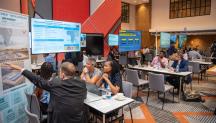.jpg?w=204&h=107&as=1&bc=ffffff&cc=1&hash=5DD00EDC4F48B75A2D6797E82A413341)
.jpg?w=201&h=105&as=1&bc=ffffff&cc=1&hash=AC74606A40900CC4BFAD3EB2111A1033)
Argentinian City Puts Solar Water Heaters on the Boil
Newsletter
Growing cities need power, heat and water in rapidly rising quantities. Argentina’s third largest city, Rosario, with a population approaching a million, is encouraging widespread use of solar water heaters as a way to help meet its energy needs sustainably.
A solar thermal ordinance requires all new or upgraded public buildings – including sports facilities and community centres – heat at least half of their hot water through solar installations. The policy, which forms part of Rosario’s Sustainable Building and Energy Efficiency Plan, broadly aims to help increase the use of renewable energy across municipal building stock.
Rosario’s households have, on average, reduced their energy costs for hot water by 80 per cent compared to the cost of conventional water heaters. Following this successful local implementation, the market for solar water heaters is expanding across Argentina. Working with national partners, the municipality provides dedicated training for other communities to adopt the heaters, together with loan options to fund installations.
Ordinances and mandates are common policy tools to encourage more sustainable building construction. For example, governments can set minimum requirements for the share of renewable energy in a building’s overall energy consumption or establish specific energy-efficiency targets.
Cities already account for nearly two-thirds of global energy use. Renewable-based solutions for cities, whether in buildings, power-generation, transport or other systems, help countries and regions to strengthen energy security and fulfill climate commitments, as well as provide social benefits for urban residents. Around the world, forward-looking cities are making progress and achieving key successes in the shift to renewables.
With urban populations growing practically everywhere, action at the municipal level is a crucial element in the world’s energy transformation. Governments, both national and municipal, can encourage, enable, measure and regulate the shift to new energy technologies. Municipal leaders and administrators can also do much to inform the local debate, raising awareness about changes before turning these into policies.
For more, see Scaling up renewables in cities: Opportunities for municipal governments.




